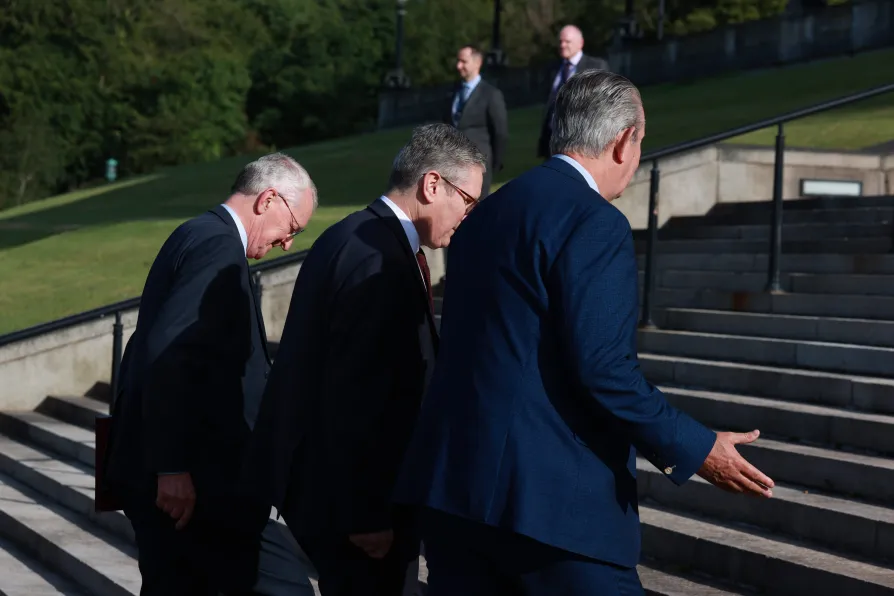From London’s holly-sellers to Engels’s flaming Christmas centrepiece, the plum pudding was more than festive fare in Victorian Britain, says KEITH FLETT
Giving a personal insight into the Labour Party conference, Sinn Fein MP CHRIS HAZZARD slams the lack of mention of the North of Ireland and the need to take the next steps in the journey from peace to Irish unity

 Prime Minister Keir Starmer (centre) Northern Ireland Secretary Hilary Benn (left), walk with Edwin Poots, Speaker of the Northern Ireland Assembly (right), as they arrive at Parliament Buildings, Stormont, July 8, 2024
Prime Minister Keir Starmer (centre) Northern Ireland Secretary Hilary Benn (left), walk with Edwin Poots, Speaker of the Northern Ireland Assembly (right), as they arrive at Parliament Buildings, Stormont, July 8, 2024
LEAVING Liverpool this week following my attendance at the British Labour Party conference, it is acutely apparent that the British government is not representing the needs and interests of people in the North of Ireland.
Anxiously peering over his shoulder at Reform, Keir Starmer’s victory over the left of his own party has been pyrrhic. Purging Labour of its leftist credentials has created a vacuum within the British working class, into which Nigel Farage’s parasitic politics is busily embedding itself. Rather than leverage the Labour landslide to deliver a popular left agenda, Starmer has opted instead to gamble on a rightwards trajectory.
The Starmerist gambit of accommodating the far right — typified in his “island of strangers” rhetoric — is doomed to failure. It can be seen in Germany, where the AfD is now topping polls nationwide. Polls speak for themselves.
An Ipsos survey undertaken in mid-September revealed Starmer’s approval rating (a net satisfaction rating of minus 66 per cent) to be lower than any British Prime Minister since records began. Similarly, Labour has trailed Reform in every single opinion poll between May 2025 and now.
Most recently, the proposed introduction of a digital ID is further evidence and reinforces the fact that the North remains harshly exposed to collateral damage from the machinations of Britain’s domestic politics.
Labour must return to its roots. Starmer cannot claim to be “non-ideological” and lead a party that provides a collective voice for working-class interests and socialist principles.
At this stage, the only steadfast “principle” held by Starmer is his support for Israel. In September, in an episode underscoring the moral bankruptcy of his position, the British Prime Minister feted Israeli President Isaac Herzog in 10 Downing Street just days before the UN Independent Commission of Inquiry on the Occupied Palestinian Territory concluded that Herzog had “incited the commission of genocide.”
Moreover, with an Orwellian twist of both logic and morality, the British government is directly complicit in providing logistical support and military materiel to genocidal Israel while simultaneously, on the domestic front, introducing draconian legislation to prosecute peaceful anti-genocide protesters as “terrorists.”
Having lagged behind most UN general assembly members, Britain’s subsequent recognition of the state of Palestine was conceded only through effective grassroots electoral pressure. As recently as July 2025, Starmer attempted to use Palestinian statehood — an inalienable right — as a bargaining chip in its interactions with Israel.
Commendably, the Labour membership defied its leadership by voting in favour of a conference motion to commit the party to accept the findings of the UN Commission of Inquiry, acknowledging that Israel is committing genocide in Gaza.
Closer to home, having announced a “new era” in British-Irish relations earlier this year, the actions of Starmer’s government have, to date, conversely demonstrated a commitment to the status quo with continued austerity policies and broken guarantees. Conspicuously absent from the Labour leader’s hour-long conference speech was a single substantive reference to the North.
Sinn Fein wants a constructive working relationship with the Labour government. In the near term, a test of this relationship will be the repeal and replacement of the shameful Legacy Act. Forthcoming legacy legislation must be human rights compliant, establish structures that are truly independent, and secure maximum confidence among victims’ families.
To date, continued obstruction of a public inquiry into the killing of Sean Brown has typified a reluctance to lift the veil of secrecy which shrouds Britain’s role in the recent past and raises fundamental questions about the British government’s intent.
All the while, the pro-Irish unity argument is gathering momentum. Sinn Fein is now the largest party in the North at local government, Assembly, and Westminster levels. In this context, and to echo the words of my party leader, Mary Lou McDonald TD, during her address at the Labour Party conference, there must be a systemic focus on our constitutional future.
Established in March of this year and led by the Department of the Taoiseach and the British Cabinet Office, UK-Ireland 2030 Steering Group must be leveraged beyond the advancement of a shared policy agenda to explore the implications of constitutional change.
In short, as we transition from peace to Irish unity, the Labour government must assume a leadership role — alongside the Irish government — to deliver legal, fair, and decisive referenda on unity, within a negotiated timeframe and by the end of this decade.
The Labour government played a vital role in securing peace in 1998. In the ongoing battle for the soul of the British Labour Party, its leadership must rediscover the spirit of ’98 as we seek to open a new chapter in the chronicle of British-Irish relations.










